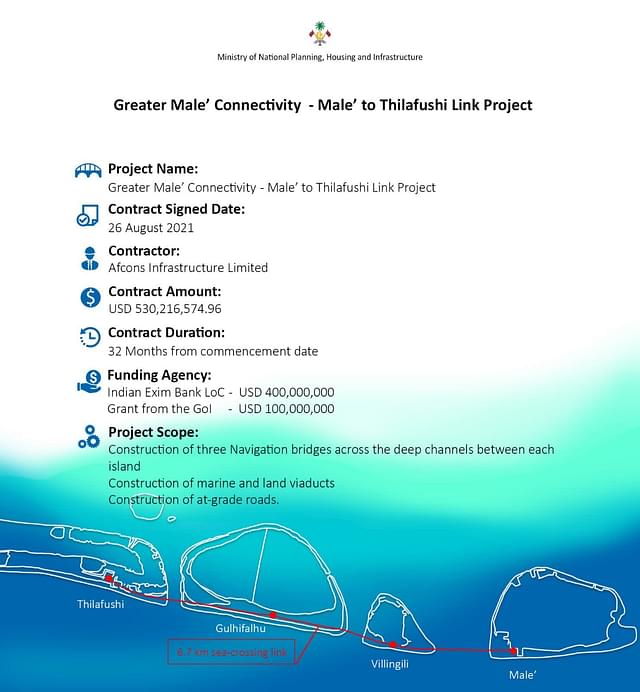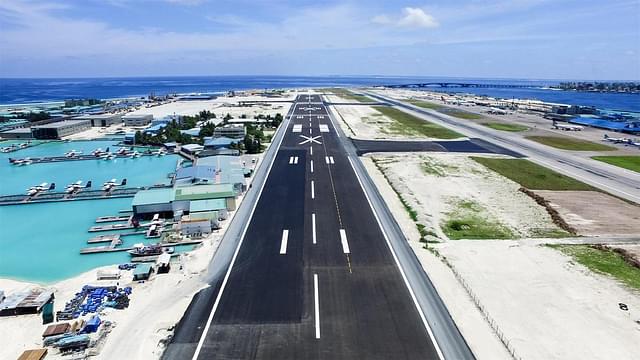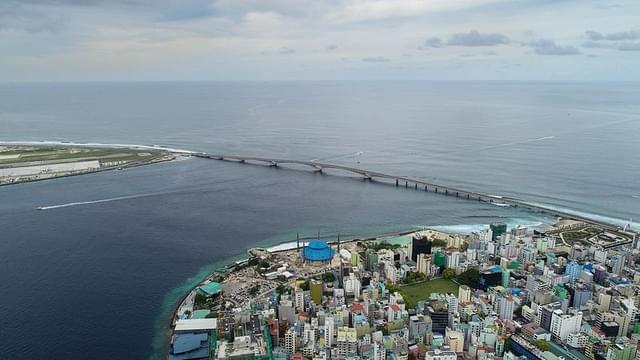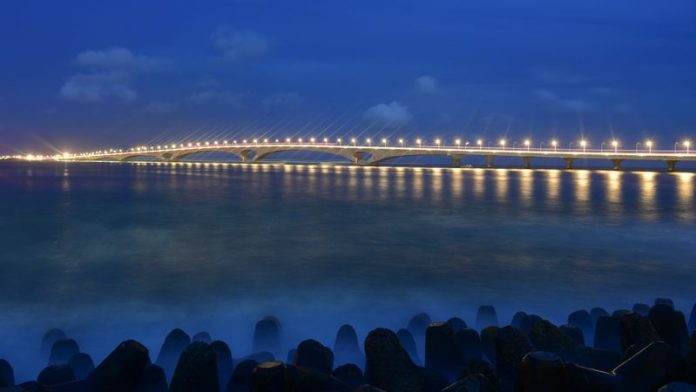Maldives elected a new President on 30 September, with voters dumping the pro-India incumbent President Ibrahim Mohamed Solih for the pro-China opposition challenger Mohamed Muizzu.
Muizzu, the main opposition candidate from the PPM/PNC coalition (Progressive Party of the Maldives and People’s National Congress), defeated the incumbent president, securing approximately 54 per cent of the votes.
The outcome in South Asia’s smallest democracy has raised questions for India about the state of its infrastructure ties with its neighbour, just as it expands its focus beyond.
Evidently, the millions of dollars that India has invested in infrastructure projects across the 1,200 islands and atolls during Solih’s tenure did not yield the expected results.
To add complexity, competing domestic rivalries in Maldivian politics have created a turbulent triangular dynamic between Delhi, Male and Beijing.
The Indian Factor
The engagement between the two countries is based on India’s “Neighborhood First” and Maldives’ “India First” policy, with India participating in various developmental projects in the island nation.
Some of the big projects in various stages of implementation include the Gulhifalhu Port, airport development at Hanimaadhoo and Gan Island, the expansion of facilities of Maldives Industrial Fisheries Company Limited (MIFCO) and the Greater Male Connectivity Project among others.
On the island of Gulhifalhu, a port is under development, funded through a Line of Credit Facility provided by the EXIM Bank. This port, scheduled for completion in 2026, is expected to address the capacity issues at the existing main port located in Maldives’ capital Male — Male Commercial Harbour.
The engineering, procurement, and construction tender for Indian companies, for the development of the Gulhifalhu port, is expected to be floated by the South Asian island nation by the end of the current financial year 2023-24.
In August 2020, New Delhi had decided to support the implementation of the Male to Thilafushi link project, popularly known as the Greater Male Connectivity Project (GMCP), following a request from the Maldives government.

The project involves constructing a 6.7-km-long bridge and causeway network that will connect Male with the neighboring islands of Villingili, Gulhifalhu, and Thilafushi.

In addition to enhancing connectivity in the Greater Male region, the bridge will serve as a new engine of economic activity in the Maldives by providing connectivity to the Gulhifalhu Port and the Thilafushi Industrial Zone.
The project was awarded to Afcons Infrastructure Ltd, a Shapoorji Pallonji Group firm, in August 2021. The pouring of the first concrete during President Solih’s visit in June 2022 marked the commencement of permanent works.
Similarly, India is assisting the Maldives with the Addu Development Project. This key infrastructure project is essential for Addu to establish itself as the southern regional hub of the Maldives.
The Chinese Largesse
The large-scale infrastructure investment in the Maldives has been viewed as New Delhi’s way of countering the similar financial largesse from China.
Notably, this was facilitated by Abdulla Yameen Abdul Gayoom’s administration (November 2013-November 2018) which was particularly amenable to Beijing’s commercial overtures.
Coincidentally, it was in 2013 when Xi Jinping became the Chinese president and launched the ambitious Belt and Road Initiative (BRI) a few months later.
In 2014, President Xi visited Maldives and underlined the idea of increased connectivity between the two countries by proposing the Maritime Silk Road (MSR) initiative, the maritime half of the BRI. Later that year, both countries agreed to jointly promote the construction of the 21st Century MSR. Maldives thus became the second South Asian nation, after Sri Lanka, to formally endorse the BRI.
Since then, China has been actively involved in developing capital assets in the Maldives, with the most noticeable infrastructural investments made in the capital, Male and the nearby island of Hulhumale.
These include the extension of Velana International Airport in Male (previously known as Ibrahim Nasir International Airport) and the construction of the Sinamale Bridge.

Incidentally, GMR Male International Airport Limited (GMIAL), a subsidiary of GMR Infrastructure of India, initially secured the contract to modernise and operate the Ibrahim Nasir International Airport in 2010 for 25 years.
However, later, the government under Abdulla Yameen awarded the contract to the ‘Beijing Urban Construction Group’ in 2014, which subsequently constructed a new runway, a fuel farm, and a cargo terminal.
Notably, when the Maldives terminated its accord with GMR, the Indian entity invoked the jurisdiction of a Singapore-based international arbitral tribunal.
In the aftermath, the Maldives were ordered to pay compensation of $270 million to GMR, which Male settled immediately, leading to speculation that China had provided the amount to the Maldives.
The most visible sign of Yameen’s pro-Beijing stance is the China-Maldives Friendship bridge, officially the Sinamale Bridge, inaugurated during his tenure in August 2018.
The 1.39-kilometre bridge linking the island of Male with Hulhule, where the international airport is located, was built by the Second Harbor Engineering Company, a subsidiary of the state-owned company China Communications Construction Company.
The Chinese Government contributed $126 million, covering approximately half of the construction expenses.
As the first cross-sea bridge in the Maldives, it enables locals and tourists to travel between the two islands within five minutes.

For years, the Maldivian populace relied heavily on ferries for inter-island transportation. Therefore, the construction of this bridge has garnered widespread acclaim, fostering a positive sentiment for the Chinese.
Not to be outdone by China, India is also funding its own “friendship” bridge in the Maldives — the Greater Male Connectivity Project. This four-times longer project would link Male with three other nearby islands.
At Stake
The return of a government in the Maldives with a pro-China shift carries significant implications, with a considerable stake for India.
To begin with, the biggest challenge for India concerning various projects lies in meeting its ambitious completion dates. Historically, India suffers from a negative image of having an implementation problem when it comes to its projects in South Asia.
For example, the GMCP project agreement stipulates the completion of the bridge by 2023. However, due to the disruptions caused by the COVID-19 pandemic, work has not progressed as desired.
Similarly, the Tata group’s residential project on Ameeru Ahmed Magu is also proceeding at a steady pace, but concerns exist over this project too.
If India fails to deliver on the deadlines for ongoing projects, it could potentially have a negative impact on bilateral relations and could be used as an excuse to stoke anti-India sentiments.
“That is a problem, because countries complain that India doesn’t deliver on projects and they tend to make comparisons with China,” said Dr Gulbin Sultana, a research analyst at the Manohar Parrikar Institute for Defence Studies and Analyses, whose area of research includes Maldives.
Moreover, narrowing the disparity between promised and actual delivery could diminish the advantage that China currently holds over India in the Maldives or the neighboring region.
Another anxiety emanating from the recent political changes in Maldives is that Indian projects going ahead might not be a done deal, and the GMR fiasco serves as a stark reminder of this uncertainty.
Mohamed Saeed, Member of Parliament for Maavashu and Vice President of the PNC, has expressed his objections to the GMCP project both in Parliament and on Twitter. These range from questions about the quality of construction, its environmental impact, particularly on Vilimale reef, and claims that Afcons has gone bankrupt.
“This is a much more serious issue than the GMR case,” Saeed said, a statement which should concern India.
To add, Maldives’ new president has already endorsed the role of Beijing’s flagship infrastructure programme in the development of participating countries.
Irrespective of the policy priorities of the new administration, China’s influence and interest in Maldives is unlikely to diminish. India must expect that Chinese projects under the Belt and Road Initiative will likely increase in the coming year, writes Dr Vinitha Revi, who is an independent scholar associated with the Observer Research Foundation
As Muizzu starts his first term as the next Maldivian leader, India’s diplomatic approach to the developmental initiatives in its small southern neighbor will invariably come under more scrutiny.


